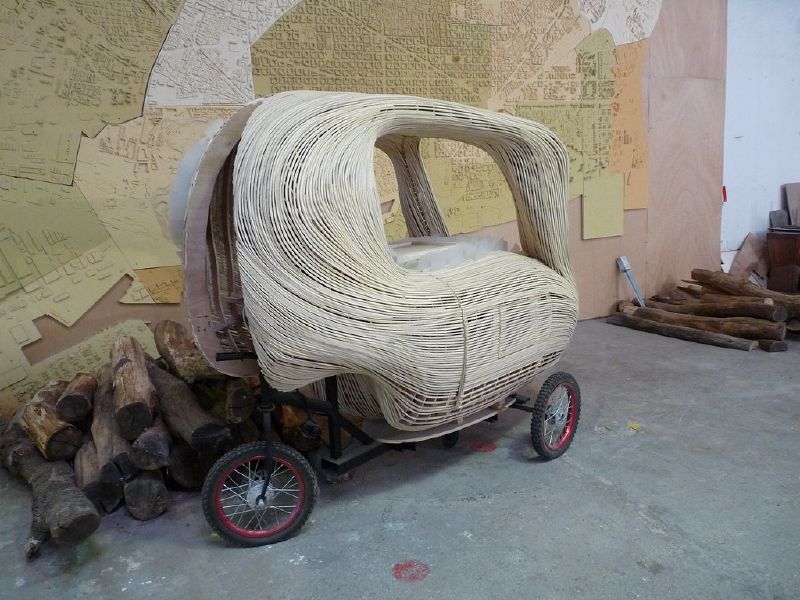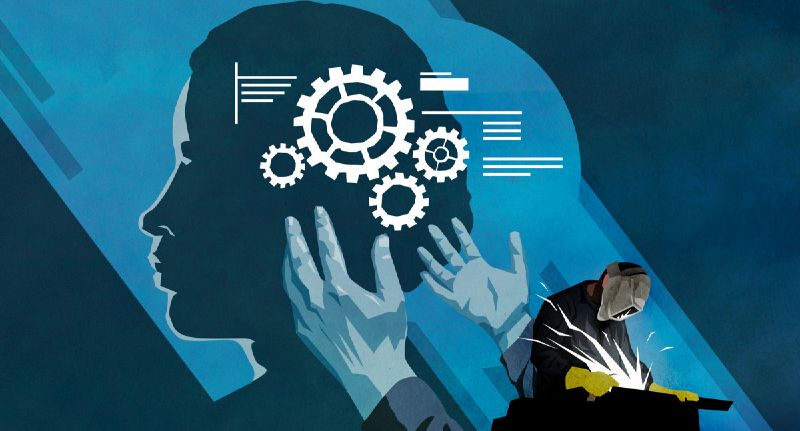
DisCOs combine local and global in ways that make sense:
Corporations extract resources as if they were infinitely abundant, while restricting immaterial flows of knowledge, usually reproducible at marginal cost, through intellectual property laws and patents. In the DisCOverse physical production is kept local and needs-based, while knowledge, resources and value flows are shared at the global level with like-minded initiatives. The ultimate aim is to create a political and cultural counterpower to the prevailing corporate/capitalist economy.
This creation of counterpower also requires remediating exclusionary social practices and fighting the deliberate invisibility of environmental impacts. These are habituated responses carried over from mainstream techno-cultures into peer production communities. DisCOs foster explicit attention to environmental justice and the various forms that enclosure can take, in the so-called new industrial revolution.
In short: DisCOs keep physical production bioregional while sharing knowledge production globally.
Overview
DisCOs have a transnational orientation. Going local is full of positives: It rekindles relations with those close to us and the environments surrounding us. Initiatives with a local focus such as Transition Towns, Bioregionalism, Local Futures etc, are centered on localism and provide great resources which are applicable to DisCO.
This is however not enough. Taken to extremes localism can favor lifeboat strategies and lack of solidarity with other locales, who may be characterized as competitors for resources, rather than allies. Going further, preppers and militias are the dark side of localism and fully incompatible with DisCO values.
What this means is that our approach to going local includes the awareness that we live in an interconnected world in both the positive and negative senses. Positives are the fact that we can communicate and share knowledge with each other at marginal cost. Negatives are the ravages of colonialism which have overtly privileged countries in the North while extracting resources and labor from the south. This process continues apace under neoliberalism.
To balance this, local strategies need to be in solidarity with all bioregions and not limited to caring for the one we happen to have been born in or live in. There is a way forward that can rekindle these tensions. It combines digital and physical production to produce within our communities, democratically and with respect for nature and its carrying capacity.
DisCO Principle 4: Rethinking Global/Local Economics has its origins in Commons Based Peer Production (CBPP). Despite the awkward name, CBPP supports much of our online life. It describes internet-enabled, peer-to-peer infrastructures that allow people to communicate, self-organize and produce together. The value of what is produced is not extracted for private profit, but fed back into knowledge, design and software commons — resources which are managed by a community, according to the terms set by that community. Wikipedia, WordPress, the Firefox browser and the Apache HTTP web server are some of the best-known examples.
If the first wave of commons-based peer production was mainly created digitally and shared online, we now see a second wave spreading back into physical space. Commoning, as a longstanding human practice that precedes commons-based peer production, naturally began in the material world. It eventually expanded into virtual space and now returns to the physical sphere, where the digital realm becomes a partner in new forms of resource stewardship, production and distribution. In other words, the commons has come full circle, from the natural commons described by Elinor Ostrom, through commons-based peer production in digital communities, to distributed physical manufacturing.
This recent process of bringing peer production to the physical world is called Design Global, Manufacture Local (DGML). Here’s how it works: A design is created using the digital commons of knowledge, software and design, and then produced using local manufacturing and automation technologies. These can include three-dimensional printers, computer numerical control (CNC) machines or even low-tech crafts tools and appropriate technology — often in combination. The formula is: What is “light” (knowledge) is global, and what is “heavy” (physical manufacture) is local. DGML and its unique characteristics help open new, sustainable and inclusive forms of production and consumption.
Imagine a process where designs are co-created, reviewed and refined as part of a global digital commons (i.e. a universally available shared resource). Meanwhile, the actual manufacturing takes place locally, often through shared infrastructures and with local biophysical conditions in mind. The process of making something together as a community creates new ideas and innovations which can feed back into their originating design commons. This cycle describes a radically democratized way to make objects with an increased capacity for innovation and resilience.

Examples of the DGML approach include WikiHouse, a nonprofit foundation sharing templates for modular housing; OpenBionics, creating three-dimensional printed medical prosthetics which cost a fraction (0.1 to 1 percent) of the price of standard prosthetics; L’Atelier Paysan, an open source cooperative fostering technological sovereignty for small- and medium-scale ecological agriculture; Farm Hack, a farmer-driven community network sharing open source know-how amongst do-it-yourself agricultural tech innovators; and Habibi.Works, an intercultural makerspace in northern Greece where Syrian, Iraqi and Afghan refugees develop DGML projects in a communal atmosphere.
This ecologically viable mode of production has three key patterns:
1) Nonprofit: Objects are designed for optimum usability, not to create tension between supply and demand. This eliminates planned obsolescence or induced consumerism while promoting modular, durable and practical applications.
2) Local: Physical manufacturing is done in community workshops, with bespoke production adapted to local needs. These are economies of scope, not of scale. On-demand local production bypasses the need for huge capital outlays and the subsequent necessity to “keep the machines running” night and day to satisfy the expectations of investors with over-capacity and over-production. Transportation costs — whether financial or ecological — are eradicated, while maintenance, fabrication of spare parts and waste treatment are handled locally.
3) Shared: Idle resources are identified and shared by the community. These can be immaterial and shared globally (blueprints, collaboration protocols, software, documentation, legal forms), or material and managed locally (community spaces, tools and machinery, hackathons). There are no costly patents and no intellectual property regimes to enforce false scarcity. Power is distributed and shared autonomously, creating a “sharing economy” worthy of the name.
The commons created by this dynamic are not limited to technological or manufacturing practices. It could develop into a pluriverse of stories of our relation to the land, to territory and to making. It's also not an exclusionary high tech vision predicated in notions of "progress" that have more to do with capital expansion than meeting social or environmental needs.
Principle 4 incorporates indigenous, convivial and feminist technologies and practices as well as endeavors like permaculture, landscape restoration, regenerative design and rewilding.
It also questions the role and prevalence of technology itself. The DisCO Pink Paper asks "What does Anticapitalist, Decolonial and Intersectional Feminist Tech look like?" This approach is key to DisCO and the inquiry extends to the necessity and longevity of tech. We're now expected to need new devices every couple of years and resign the obsolete one to the rubbish pile. Can we design tech that meets actual human needs, not artificially created consumerist desires? Can we design tech that lasts for 100 years, 200 hundred? That is designed to evolve, compost and be created anew in resonance with life's cycles? These are very different notions of production, technology and human needs.
DisCO Principle 4 is about preserving and restoring a livable planet. If the revolutionary call of the 20th century was seizing the means of production, this is no longer necessary or recommendable. Rather, we need to reinvent the means of production; to radically reimagine the way we produce. We must also decide together what not to produce, and when to direct our productive capacities toward ecologically restorative work and the stewardship of natural systems.
Examples
DisCO.coop is crewed by the DisCO core crew and Pink Board. Together we're spread among various locations in Spain, Berlin, London, Glasgow, Amsterdam and Umea in Europe; in Massachusetts, Washington State, California and rural Wisconsin in the US; and in Mexico. We are all activists, and our work in the DisCO Project is designed to be replicated and developed transnationally.
Why this is important
In progress. Please check back soon for updates.
Tensions
In progress. Please check back soon for updates.
Interactions with other principles
In progress. Please check back soon for updates.
Related Elements
In progress. Please check back soon for updates.
More Resources
In progress. Please check back soon for updates.
TLDR
- Bulleted list item
Image Credits
- Lead Image by Stan Jourdan
- Additional Image sourced from Reimagine, Don’t Seize, the Means of Production a 2018 article with an earlier version of parts of the Overview texts.